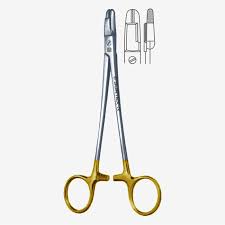Introduction:
In the realm of surgical precision, TC instruments stand as pillars of excellence. TC, or Tungsten Carbide, instruments offer unparalleled durability, sharpness, and reliability, making them indispensable tools in various surgical specialties. This comprehensive guide explores the multifaceted world of TC instruments, delving into their composition, applications, and the transformative impact they have on surgical outcomes.
Understanding TC Instruments:
TC instruments derive their name from the incorporation of Tungsten Carbide, a remarkably hard and wear-resistant material, into their tips or cutting edges. This infusion of Tungsten Carbide enhances the durability and sharpness of the instrument, ensuring sustained performance even under the most demanding surgical conditions.
Composition and Construction:
TC instruments feature stainless steel handles or shafts, providing a sturdy grip for the surgeon. The critical components of TC instruments are the Tungsten Carbide inserts or tips, meticulously bonded to the instrument’s working ends. These inserts are precision-engineered to maintain sharpness and edge retention throughout prolonged use, facilitating precise tissue manipulation and dissection.
Applications Across Surgical Specialties:
TC instruments find wide-ranging applications across various surgical specialties:
General Surgery:
In general surgery, TC instruments are utilized for meticulous dissection, hemostasis, and tissue manipulation in procedures such as laparotomy and appendectomy.
Orthopedic Surgery:
Orthopedic surgeons rely on TC instruments for cutting, drilling, and shaping bone during procedures such as total joint replacement and fracture fixation.
Neurosurgery:
TC instruments play a crucial role in neurosurgical procedures, where delicate tissue handling and precise dissection are paramount for preserving neurological function.
Dental Surgery:
Dentists and oral surgeons utilize TC instruments for tooth extraction, periodontal surgery, and implant placement, owing to their sharpness and precision.
Advantages of TC Instruments:
The adoption of TC instruments brings several advantages to surgical practice:
Enhanced Durability:
The incorporation of Tungsten Carbide ensures prolonged instrument lifespan, reducing the frequency of replacements and associated costs.
Superior Sharpness:
TC instruments maintain a consistently sharp edge, enabling precise tissue dissection and minimizing trauma to surrounding structures.
Optimal Performance:
TC instruments offer reliable performance even in demanding surgical conditions, contributing to improved surgical outcomes and patient safety.
Conclusion:
In conclusion, TC instruments represent a pinnacle of surgical innovation, offering unmatched durability, sharpness, and reliability. Their widespread applications across surgical specialties underscore their versatility and efficacy in diverse clinical settings. As surgical technology continues to evolve, TC instruments remain indispensable tools in the hands of skilled surgeons, shaping the future of surgical practice and patient care.

